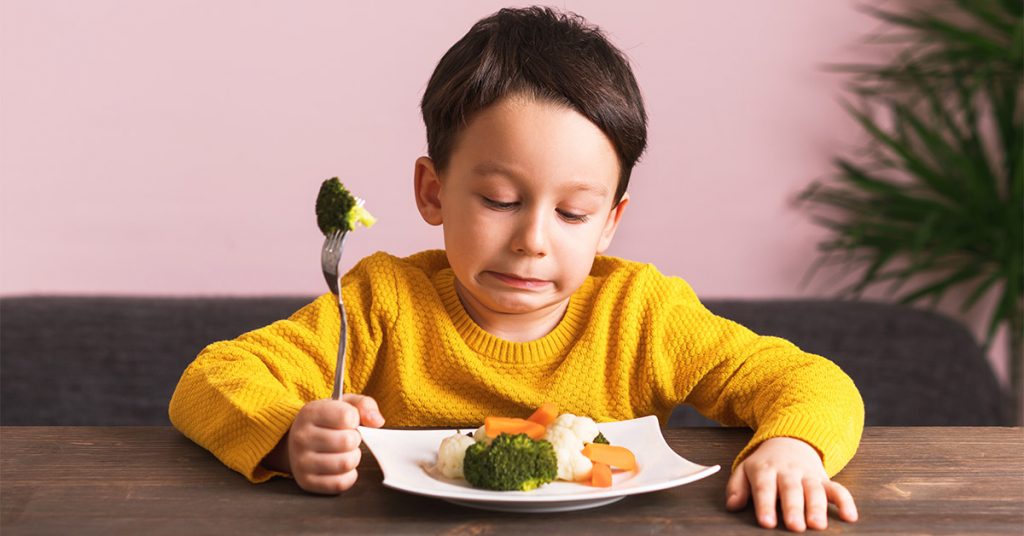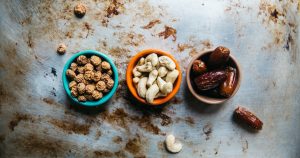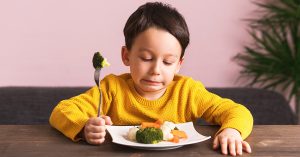Every parent’s dream is for their kids to eat healthy and for there to be no more mealtime battles. We know that telling our kids to clean their plates or withholding dessert as a threat isn’t working, nor is it teaching our children intuitive eating. The big questions start with how. How do we get our kids to eat their veggies? How do we reduce their sugar intake without making them (and us) miserable?
In recent years, more and more people are turning to a plant-based diet, for a myriad of reasons. However, if you hear “plant-based,” you might also scoff. Is it really, truly realistic that our entire family go plant-based, and is it worth it? I have good news for you.
Scary Mommy checked in with two plant-based diet experts to get their take. Reshma Shah, MD MPH, board-certified pediatrician, and adjunct instructor at Stanford, along with her co-author, Brenda Davis, a registered dietitian wrote “Nourish: The Definitive Plant-Based Nutrition Guide for Families.” They’re here to teach us all we need to know about implementing a plant-based diet for our family, whether we do it 100% or partially.
A Plant-Based Diet, Defined
Brenda Davis, RD, characterizes a plant-based eating regimen as one that is “either generally or only plant food sources.” Adding, “Plant-based weight control plans can be semi-veggie lover (which means limited quantities of creature items are burned-through), pescovegetarian (vegan in addition to fish), lacto-ovo vegan (plants in addition to dairy and eggs) or vegetarian (no creature items).” Dr. Shah shares that a plant-based eating regimen is one that incorporates “vegetables, organic products, entire grains, lentils, beans, seeds, and nuts.”
Is A Plant-Based Diet Safe And Healthy?
An unavoidable issue many guardians ask is if a plant-based eating routine is protected and, truth be told, sound. All things considered, many eating regimens guarantee to be the arrangement for extreme wellbeing, and we as a whole realize that a large number of those are tricks. They are additionally very protein (and in some cases fat) loaded. Dr. Shah shared that “Institute of Nutrition and Dietetics unequivocally expressed that properly arranged plant-based eating regimens (counting veggie lover and vegetarian abstains from food) are energizing and healthfully sufficient during ALL phases of the lifecycle including pregnancy, lactation, outset, youth, puberty, and for competitors.” I was additionally guaranteed that the individuals who eat without gluten and the people who are diabetic can securely eat a plant-based eating routine.
Supplementation Is Necessary
According to Dr. Shah, it’s imperative that any family committing to eat plant-based makes sure they get “adequate quantity and variety of foods including fortified foods and supplements when indicated.” Registered Dietitian Brenda Davis explains that those of us who choose a plant-based diet “may consider specific supplements such as vitamins B12, D, iodine, and long-chain omega-3 fatty acids.” She notes that B12 isn’t generally available from plant foods.
What About Protein?
A common argument I hear against eating plant-based in lieu of lots of dairy and meat, is that plant-based diets lack the protein our bodies need. I was raised in the 1980s when parents were told that children must drink three glasses of milk a day in order to build strong bones and fill up on some protein. Dr. Shah reminds us that fortified soy milk contains the same amount of protein and calcium as “regular” (cow’s) milk, and plant-based proteins like tofu and veggie-meats contain just as much protein as animal meat. There’s a major perk to getting your protein from plant-based foods. Dr. Shah shared that “multiple studies have demonstrated increased longevity and reduced risk of disease” when you eat plant-based.
Benefits of a Plant-Based Diet
When researching, I discovered that there are many potential benefits to adhering to a plant-based diet. Dr. Shah shares, “Working towards a more plant-based diet offers many health advantages including a lower risk of developing several chronic diseases such as heart disease, type 2 diabetes, and certain types of cancer.” Brenda Davis adds that there’s also the added perk of being leaner and reducing our risk for “diverticular disease, fatty liver disease, cataracts, and kidney disease.”
Plant-Based Foods Can Be Delicious
I concede, when I changed to a for the most part plant-based eating regimen, I was overpowered. Is it safe to say that i was bound to snack on seeds and nibble on pears for the remainder of my life? A kale smoothie wasn’t actually engaging, yet I knew there were significant advantages to this eating regimen. Fortunately, the writers offer numerous, tasty plant-based plans in their book, including cranberry orange almond biscuits, fresh tofu fingers, peanut butter brownies, and lemony chickpea pasta. The creators let me know that their plans are family-accommodating. Dr. Shah additionally takes note of that even one fixing, similar to dark beans, can be utilized in a wide range of ways, for example, lentil soup, dark beans and rice, and spicy burros. (On an individual note, there are some stunning dark bean brownie plans on the web.) Plant-based food sources offer character, yet assortment.
Plant-Based On-The-Go
I asked the creators, can families who are consistently in a hurry, between work, school, and extracurriculars, eat a plant-based eating routine? Brenda Davis guaranteed me, “Most advantageous omnivorous food sources have similarly helpful plant-based partners. Furthermore, plant based dinners don’t should be excessively tedious to get ready. A sandwich and a bowl of soup is an entirely OK supper.” In my family’s case, there are six of us, and we as often as possible snatch a plant-based protein bar and a piece of entire natural product when surging out the entryway. It’s similarly as simple to eat plant-based as it isn’t to.
Plant-Based Eating Is Affordable
I’ve read from many parents that “healthy eating is too expensive.” Brenda Davis replies, “The poorest people on the planet eat plant-based.” This is because animal products cost more. She gives the example of grains and beans being cheaper than meat or fish. She recognizes that processed plant-based foods tend to cost more than animal-processed plant based foods, such as a nut-based cheese versus a dairy cheese; these are extras in a plant-based diet and not necessities. She notes that beans, grains, vegetables, fruits, nuts, and seeds are “fairly reasonably priced.” Buying in bulk and growing some of your food (if that’s your cup of tea) can also help cut costs. Dr. Shah also notes that we don’t have to make eating so overwhelming and complicated. An apple and peanut butter is a perfectly sufficient, easy snack.
Is Plant-Based Eating All Or Nothing?
I wanted to know, are we cheating if we only eat plant-based sometimes? Is something better than nothing? Brenda Davis reassured me that going partially plant-based is “a great step.” After all, “Every step a person takes towards a more healthful, ethically sound, and ecologically sustainable diet is worth celebrating.” Also, she shares that “there are no vegan police.” Certainly, making dietary changes is a big deal, especially if your whole family does it, so offer up some patience, room for mistakes, and trial-and-error with recipes.
Despite eating a mostly plant-based diet for several years now, I learned a lot from the authors. Eating plant-based is feasible, it can save us on our grocery bill, and with some creativity, we can whip up meals and snacks that please us all.







58 thoughts on “A Plant Based Diet May Be Exactly What Your Family Needs To Finally Eat Healthy”
Comments are closed.